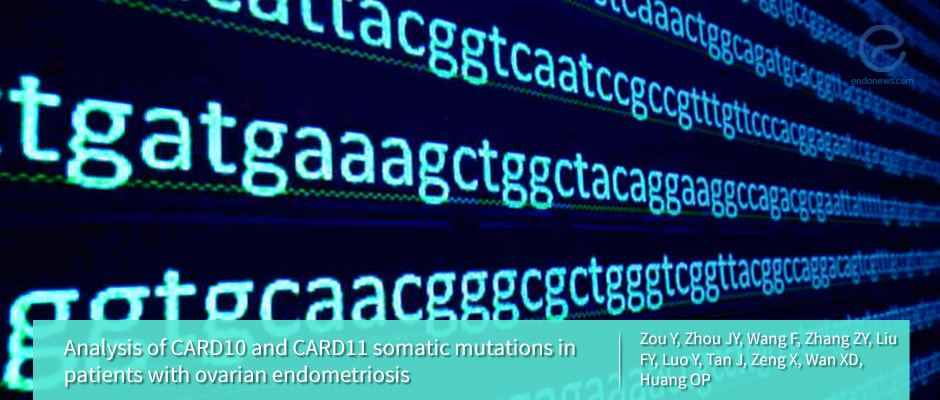CARD10 and CARD11 Mutations: Another Piece of the Puzzle
Aug 8, 2018
2 CARD10 and 2 CARD11 gene mutations were identified that could better explain the pathogenesis of endometriosis.
Key Points
Highlights:
- The study analyzes two mutations, namely caspase recruitment domain family member (CARD)10 and CARD11 mutations, and its impact on endometriosis disease progression.
Importance:
- Research has yet to elucidate the exact molecular mechanisms that initiate and promote endometriosis. A greater understanding of the mechanism will lead to more targeted and efficient therapies.
What’s done here?
- Participants: 142 female patients with ovarian endometriosis (only 101 were actually included)
- Samples collected during surgical resection of ovarian endometriotic lesions and paired peripheral blood samples
- Mutational analysis of the genes in question by genomic DNA that was isolated from the above samples and then amplified using polymerase chain reaction (PCR), then verified by sequencing.
- Evolutionary conservation analysis through the GenBank. 21 vertebrate species were included in this step.
- Bioinformatics programs used to predict mutations and all data were subject to statistical analysis.
Key results:
- 4 novel somatic mutations were identified in 4 different samples. These mutations are as follows:
- 2 in-frame deletions found in CARD10 (at c.785_790 and c.785_802)
- 2 heterozygous missense mutations found in CARD11 (at c.49 and c.160)
- The patients with each of the aforementioned mutations had other medical or gynecological conditions such as uterine leiomyoma, increased cancer antigen levels, lower blood eosinophil granulocyte ratio and exhibited increased serum creatine kinase levels
- Research states that the mutations studied could very well be disease-causing
Limitations of the study:
- The authors listed the following as limitations of the study:
- Small sample size
- Failure to obtain data that determines if the samples with the mutations of interest would exhibit more inflammation within the endometriotic lesions or serum
Lay Summary
Zou et al., a research group from China, recently published a study titled “Analysis of CARD10 and CARD11 somatic mutations in patients with ovarian endometriosis” in Oncology Letters. The paper looked at the effects of caspase recruitment domain family member (CARD)10 and CARD11 mutations on endometriosis disease progression.
The researchers collected endometriotic lesions and paired peripheral blood from all the participants, who were female patients with ovarian endometriosis. Genomic DNA was isolated from the samples and the DNA was then amplified. Then the DNA was sequenced. The function of the mutations was identified using evolutionary conservation analysis and online bioinformatics prediction programs. The data was subject to statistical analysis.
The researchers found 4 mutations in 4 different patients. Two of the mutations were deletions in CARD10 and the other two were heterozygous missense mutations found in CARD11. Three of the four patients who had one of the aforementioned mutations were also found to have other comorbidities.
The evolutionary conservation analysis and online prediction programs yielded results that led researchers to believe that the mutations uncovered could be disease-causing.
Research Source: https://www.ncbi.nlm.nih.gov/pubmed/29928437
CARD10 CARD11 gene mutation DNA PCR bioinformatics evolutionary conservation caspase endometriosis

